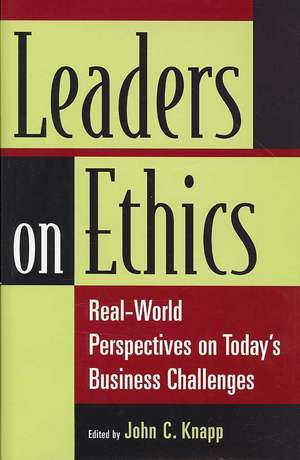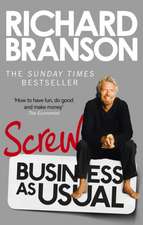Leaders on Ethics: Real-World Perspectives on Today's Business Challenges
Editat de John C. Knapp Ph.D.en Limba Engleză Hardback – 29 aug 2007 – vârsta până la 17 ani
Preț: 362.29 lei
Preț vechi: 477.96 lei
-24% Nou
Puncte Express: 543
Preț estimativ în valută:
69.32€ • 72.39$ • 57.24£
69.32€ • 72.39$ • 57.24£
Carte tipărită la comandă
Livrare economică 15-29 aprilie
Preluare comenzi: 021 569.72.76
Specificații
ISBN-13: 9780275996710
ISBN-10: 0275996719
Pagini: 136
Dimensiuni: 156 x 235 x 18 mm
Greutate: 0.36 kg
Editura: Bloomsbury Publishing
Colecția Praeger
Locul publicării:New York, United States
ISBN-10: 0275996719
Pagini: 136
Dimensiuni: 156 x 235 x 18 mm
Greutate: 0.36 kg
Editura: Bloomsbury Publishing
Colecția Praeger
Locul publicării:New York, United States
Caracteristici
Karen Katen, president of Pfizer Human Health and vice chairman of Pfizer, on ethical issues in the pharmaceutical industry. ; Ed Zinbarg, retired chief investment officer and chief administrative officer of Prudential Life Insurance Company, on what businesses can learn about ethics from the world's major religions.
Notă biografică
John C. Knapp is University Professor and Mann Family Professor of Ethics at Samford University. He is also the Leadership Director, Frances Marlin Mann Center for Ethics and Leadership, at Samford. He has also been visiting lecturer at the University of Wales and Adjunct Professor of Ethics at Columbia Theological Seminary. Knapp is the editor of For the Common Good: The Ethics of Leadership in the 21st Century (Praeger, 2007).
Recenzii
These 15 high-powered contributors understand very well that the ethics of modern society has changed rapidly, as evidenced by the behavior of ordinary individuals as well as by the heads of major businesses. They urge readers to consider maintaining an uncompromisingly high level of ethics despite what others get away with, at least for a time, and comment on using crisis as a platform for positive change, recognizing unenlightened self-interest, restoring corporate trust, tying high ethical standards to governance and free enterprise, and learning from the world's great religions. They get more specific on ethical issues in accounting and auditing, in markets where sex sells, in competitive situations, and in higher education. They urge leaders to be trustworthy, sensitive to diversity, accepting of others regardless of class or union affiliation, and capable of putting high values and ethics first.











